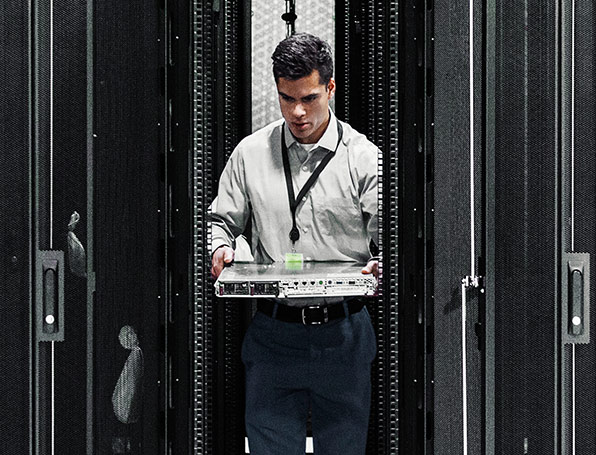What it is
Detects and mitigates the effects of unexpected and unpredictable distributed denial-of-service (DDoS) attacks.

Detect
DDoS Shield analyzes inbound IP traffic to spot anomalies and detect potential DDoS attacks.
Redirect
When under attack, DDoS Shield redirects inbound traffic to global scrubbing centers.
Scrub
Scrubbing centers return only clean, legitimate traffic to your network.
Protect
Delivered from the cloud, leverage ever-expanding DDoS mitigation capacity against large-scale attacks.
Benefits
Minimizes downtime
DDoS Shield protects network and transport layers by defending you against L3 and L4 volumetric DDoS attacks. Our Web Application Firewall also defends against L7 attacks.
Stops attacks
The highly scalable nature of DDoS Shield allows it to defend against even the largest recorded DDoS traffic volumes.
Increased availability
High redundancy and DDoS Shield’s ability to automatically fail over traffic to other nodes helps increase your uptime.
Protects traffic
The carrier-agnostic aspect of DDoS Shield lets it protect all your traffic, regardless of carrier or ISP.
Anycast routing
When under attack, it distributes traffic loads to multiple sites at the same time to help decrease the risk of network congestion.
24/7 support
Reach out to our DDoS experts in our Security Operations Centers (SOCs) by phone or email.
Full-featured DDoS Shield portal
Get access to detailed analytics and reports, as well as the ability to customize configurations.
Super POPs
When DDoS Shield reroutes under-attack traffic it directs it to scrubbing centers located in global content distribution super points of presence (Super POPs).
Are you prepared for DDoS attacks?
As you move more services to the cloud, internet connectivity becomes crucial. Any downtime caused by DDoS attacks can impact internet service and access to your applications. If you don’t currently have a DDoS mitigation service, take our self-assessment by answering the questions below to determine your risk level for DDoS attacks.
How confident are you that your business will continue to function if network communications fails?
Does your business continuity / disaster recovery plan include provisions for DDoS attack mitigation and recovery?
Have you tested your business continuity / disaster recovery plan for a network disruption event?
If an attacker brought your network down and demanded a ransom to restore service, how likely is it that you would pay the ransom?
How confident are you that your network is resilient enough to face a widespread DDoS attack?
How confident are you that your cybersecurity team understands the implications of DDoS attacks to your business?
Low Risk
Great job! Your business is at low risk for experiencing the impacts of a DDoS attack. For more information on today’s top cyberthreats, read the Verizon 2021 Data Breach Investigations Report (DBIR).
Medium Risk
Your business is at risk for experiencing the impacts of a DDoS attack. Please Contact your Verizon sales representative as soon as possible to discuss how Verizon can help protect your business from DDoS attacks and build an incident response plan to mitigate your biggest security threats.
High Risk
Your business is at HIGH RISK for experiencing the impacts of a DDoS attack. Please Contact your Verizon sales representative as soon as possible to discuss how Verizon can help protect your business from DDoS attacks and build an incident response plan to mitigate your biggest security threats.
Disclaimer: This assessment is intended to provide a quick overview of how at risk your business may be should it suffer a DDoS attack. Results may vary and even businesses with low risk may be impacted by a DDoS attack.
If you are currently experiencing a DDoS attack, please call your Verizon Sales rep immediately for DDoS Emergency Response.
Resources
2025 Data Breach Investigations Report
Today’s threat landscape is shifting. Get the latest updates on real-world breaches and help safeguard your organization from cybersecurity attacks.
Understanding the DDoS attack threat
Learn the ins and out of DDoS attacks, and how to identify and prevent them.
Protect against escalating DDoS threats
DDoS attacks grew from a 2022 median of 1.4 gigabytes per second (Gbps) to 2.2 Gbps in 2023.* Learn how DDoS Shield can help.
DDoS attack protection in the time of 5G
CxO's Guide to Resilience, DDoS Mitigation & Prevention
FAQs
A DDoS attack is an amplified version of a denial-of-service (DoS) attack. In a DoS attack, a single source, usually a computer, maliciously floods a targeted resource—a web server, a network server or a computer—with more traffic than it can handle.
In a DDoS attack, the attack is distributed—meaning the attackers have multiplied the malicious traffic by using multiple compromised systems—which could include computers, servers, smartphones and other networked resources, such as Internet of Things (IoT) devices—as attack sources. DDoS attacks can generate tremendous amounts of traffic, snarling the targeted server, service or network until it chokes.
DDoS mitigation is all about network resilience. Networks need to function without interruption. However, perimeter security doesn't often provide sufficient protection. To prevent DDoS attacks on the cloud, IT and security teams must ensure that the perimeter is secure and that firewall rules regarding dropping packets are firmly established.
The main focus should be on prevention and mitigation. Some of the most common tools and strategies to do so include:
Content delivery networks that automatically spread out traffic across thousands of servers, minimizing the chances that a tidal wave of toxic traffic overwhelms the targeted organization
Advanced firewalls that add intrusion prevention and application-specific functionality to traditional firewalls
Traffic scrubbing that redirects malicious traffic to data centers to scrub attack traffic
Source-rate limiting that blocks excess traffic from the source of an attack
DDoS Shield, Verizon’s DDoS mitigation service, helps lift the burden of protecting yourself against DDoS attacks by giving you the intelligence to help distinguish good traffic from bad traffic, and the capacity you need to combat large-volume attacks. It offers a highly-scalable attack mitigation service that helps you tackle today’s sophisticated and high-volume DDoS attacks. Plus, it works across your enterprise environment to alleviate the burden on your network and perimeter systems, and helps maintain continued availability to your customers.
